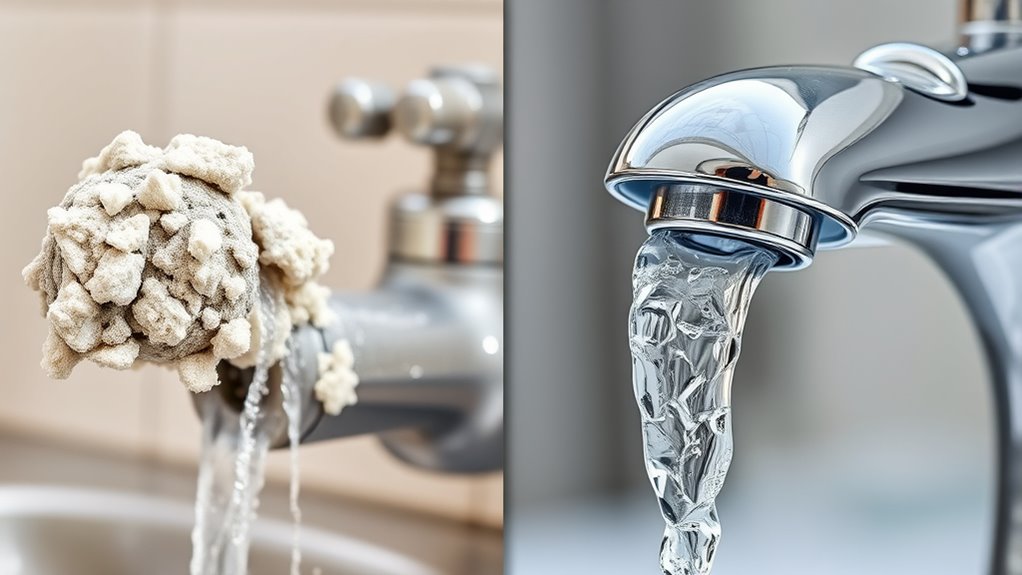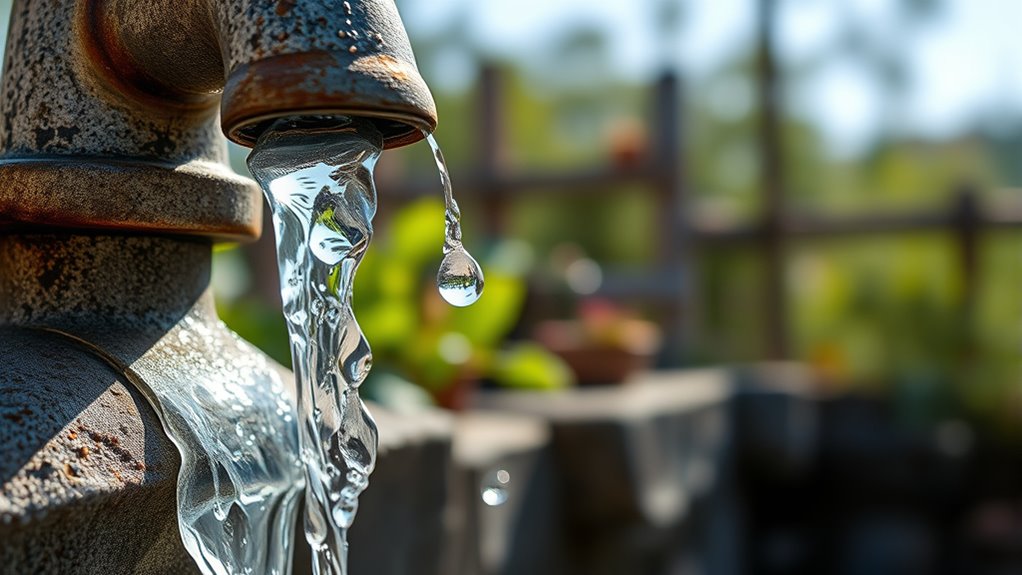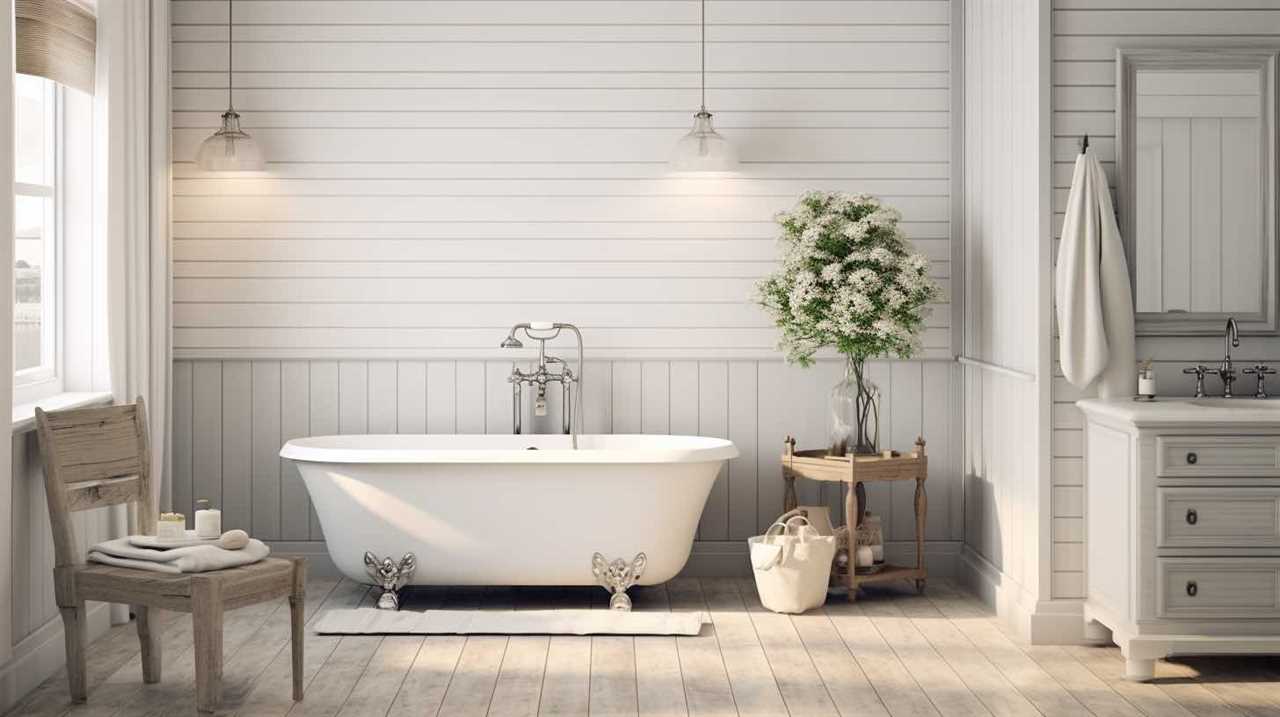Understanding the difference between hard and soft water is essential for your home’s maintenance. Hard water has more minerals like calcium and magnesium, which can cause scale buildup, damage appliances, and reduce soap’s effectiveness. Soft water has fewer minerals, helping appliances last longer, improving cleaning results, and saving money on soap and repairs. Knowing your water type helps you choose the right systems and care strategies—keep exploring to learn how this impacts your home every day.
Key Takeaways
- Hard water contains high mineral levels, causing scale buildup, plumbing issues, and reduced appliance efficiency.
- Soft water has fewer minerals, preventing scale and extending the lifespan of pipes and household appliances.
- Hard water decreases soap effectiveness, leading to soap scum and residue, while soft water improves cleaning results.
- Using soft water reduces maintenance costs by minimizing mineral deposits and corrosion inside pipes.
- Recognizing water hardness helps homeowners choose appropriate treatment systems and maintain a cleaner, more efficient home.

When it comes to water quality, understanding the difference between hard and soft water is essential because it can impact your daily life in many ways. One of the main distinctions lies in the water mineral content. Hard water contains high levels of minerals like calcium and magnesium, which can leave deposits on fixtures, appliances, and even your skin. Soft water, on the other hand, has fewer of these minerals, making it gentler on your plumbing and skin. Recognizing this difference helps you make informed decisions about water treatment and maintenance.
High mineral content in hard water can cause significant plumbing issues over time. These minerals tend to accumulate inside pipes, leading to scale buildup that narrows water flow. This buildup can result in reduced water pressure and increased energy costs because appliances like water heaters work harder to heat the water. Additionally, mineral deposits can damage plumbing fixtures and appliances, shortening their lifespan and increasing repair costs. Soft water, lacking these minerals, minimizes such risks, helping your plumbing last longer and function more efficiently. Water mineral content also influences the effectiveness of water softening systems, which can be an important consideration for homeowners.
Hard water minerals cause scale buildup, reducing flow and increasing energy costs, while soft water minimizes these issues and extends plumbing lifespan.
Another vital aspect is how water mineral content influences plumbing corrosion. Hard water’s mineral deposits can create a protective layer inside pipes, but this layer can also trap other corrosive elements, accelerating pipe deterioration in certain conditions. Conversely, soft water, with its low mineral content, tends to be less corrosive. It doesn’t leave mineral deposits that can trap or promote corrosion, which means your pipes are less likely to rust or degrade prematurely. This difference is especially important if you have older plumbing, as soft water can help extend its lifespan and reduce the likelihood of leaks or costly repairs.
Understanding whether your water is hard or soft also affects your choice of household appliances and cleaning routines. Hard water can make soap and detergent less effective, leading to soap scum on dishes and soap residue on your skin. Soft water improves cleaning efficiency, making laundry brighter, dishes cleaner, and skin softer. Plus, soft water typically requires less soap, saving you money in the long run.
Frequently Asked Questions
How Does Water Hardness Affect Household Appliances’ Lifespan?
Water hardness impacts your household appliances’ lifespan because mineral buildup from hard water can clog and damage them over time. You might notice reduced appliance durability, especially with your dishwasher, washing machine, or water heater. Hard water causes limescale, which hampers efficiency and leads to costly repairs. To protect your appliances, consider softening your water or regularly cleaning to minimize mineral buildup and extend their lifespan.
Can Water Softening Impact the Taste of Drinking Water?
You might notice that water softening can change the water taste, often making it milder and less mineral-flavored. Softening removes minerals like calcium and magnesium, which contribute to the mineral flavor in drinking water. As a result, your water may taste smoother and less metallic. Some people find this improvement preferable, while others miss the natural mineral flavor. Overall, softening impacts water taste by reducing mineral content and altering the flavor profile.
Are There Health Risks Associated With Softened Water?
Are you worried about health concerns from softened water? While softened water contains higher sodium levels, it’s generally safe for most people, but those with kidney issues or on restricted diets should be cautious. Softening can reduce minerals like calcium and magnesium, potentially leading to mineral deficiencies if your diet isn’t balanced. Overall, for healthy individuals, softened water doesn’t pose significant health risks, but staying informed is always wise.
What Are the Environmental Impacts of Water Softening Methods?
You should consider the environmental impacts of water softening methods, as they can contribute to ecological imbalance. For instance, ion exchange systems often use salt, which can lead to increased industrial pollution when excess salt enters waterways. This disrupts aquatic ecosystems and harms wildlife. By understanding these effects, you can choose eco-friendlier softening options that help maintain ecological balance and reduce pollution.
How Often Should Homeowners Test Their Water Hardness Levels?
They say, “A stitch in time saves nine,” and that’s true for water testing. You should test your water hardness levels at least once a year, or more often if you notice changes in water quality or appliances. Regular water testing helps you stay ahead of issues and follow frequency recommendations, ensuring your home’s water remains safe and effective for daily use. Don’t wait until problems arise—test proactively.
Conclusion
Knowing whether your water is hard or soft can literally save your sanity and your home! Imagine a world where soap lathers instantly, appliances never clog, and your skin stays silky smooth—every day. Don’t let hard water turn your life into a battle with mineral buildup or soft water make your pipes cry for help. Get informed now, and take control—because your home’s water quality can make or break your peace of mind!










